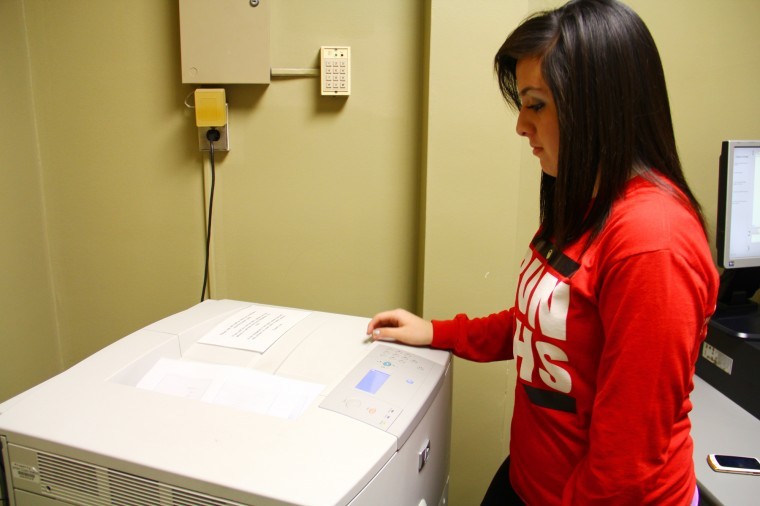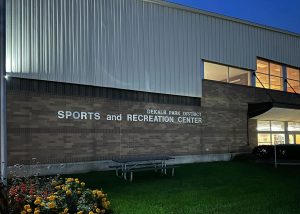NIU to participate in recycling competition
Freshman nursing major, Desiree Mancillas, prints powerpoint slides in the Grant North computer lab Monday evening.
February 5, 2012
Reduce, reuse, recycle, compete.
This year, NIU will be participating in RecycleMania and the Campus Conservation Nationals, a partnership competition among colleges in the U.S. and Canada to promote water and energy reduction. The winning institution will gain not only a spot among the Top 10 colleges for Illinois, but bragging rights as well. However, some say the real goal is conservation.
Over the course of eight weeks, Feb. 5 to March 31, students and faculty will compete to reduce waste and increase overall conservation by more than 10 percent.
In an article from “NIU Today,” Ryan Read, graduate student and lead project manager, said a goal of the program is that NIU will adopt the slogan, “Your University, Your World.”
During the competition, participating schools will be able to compare their progress with other universities and can keep track of fluctuations that occur in areas such as trash reduction and amount of recyclable materials.
Mary Drain, energy specialist at NIU. said that while she believes NIU’s current recycling programs are on a progressive track, with items available on campus such as separated recycle and garbage bins, key components of conservation could bettered.
“Reduce, reuse and recycle isn‘t just a catchy phrase; it really is a hierarchy,” Drain said. “If I had to give NIU a rating right now, I would definitely give it a B+, but there is always room for improvement.”
Drain said that often, too much emphasis is placed on learning how to recycle an already purchased item rather than making better consumer choices.
“The recycling process begins way before one even gets to the point of figuring out the best way of disposing something,” Drain said. “People need to really think about an item before they buy it, and ask themselves what other ways they can reuse it.”
Building Services, NIU’s custodial department, is currently spearheading the recycling implementation at the university.
Drain said several times a week Waste Management, 18370 Somonauk Road, comes to collect both garbage and recyclable materials from NIU. From there, recyclable content is sent to a sorting facility at 115 Simonds Ave., where items are separated into their respective categories.
However, not all recycled objects are able to be reused.
“Depending on the grade and condition of the item, it may be sold to vendors to make recycled goods,” said Michael Cooper, a Waste Management inside commercial representative. “But like everything else, recycling is a market and sometimes they have an excess of materials that they can’t always sell back. So if they can’t make a profit from it, it goes in the garbage.”
Though not all recycled goods are ultimately reused, Drain said it is atypical for non-recycled items to simply go in the trash.
Cooper said that as a general trend in 2011, recycling in DeKalb decreased slightly, citing a sell-back weakness in cardboard and plastics.
“That’s very unusual to happen to anything besides plastics,” Drain said. “As a user, we need to ask, ‘Do I really need this thing in plastic?’ It’s a very fussy material.”
Drain said what is thrown away is usually very limited.
“If there’s not some end use, such as selling it, they will toss it,” Drain said. “But very rarely is it ever something like paper or newsprint.”
NIU’s ITS Helpdesk said there are 19 individual computer labs open to all students, although at a minimum at least 20 other departments have labs open to specific majors. Every lab is equipped with at least two printers that first print out a document with the student’s Z-ID, date and time. ITS Helpdesk said the Z-ID pages are for student protection and to help students identify which print job is theirs.
NIU’s fall student enrollment stood at 23,051. This means that if every student prints at least one document, 46 reams (922 lbs) of Z-ID papers would be printed and immediately sent to recycling.
Drain said emphasis on reusing items and reducing waste would likely have better effects on NIU’s recycling program overall, but progress is in the hands of students and faculty.
“You’ll never get people to do ethical things by kicking and screaming,” Drain said. “They have to want to do it on their own.”







